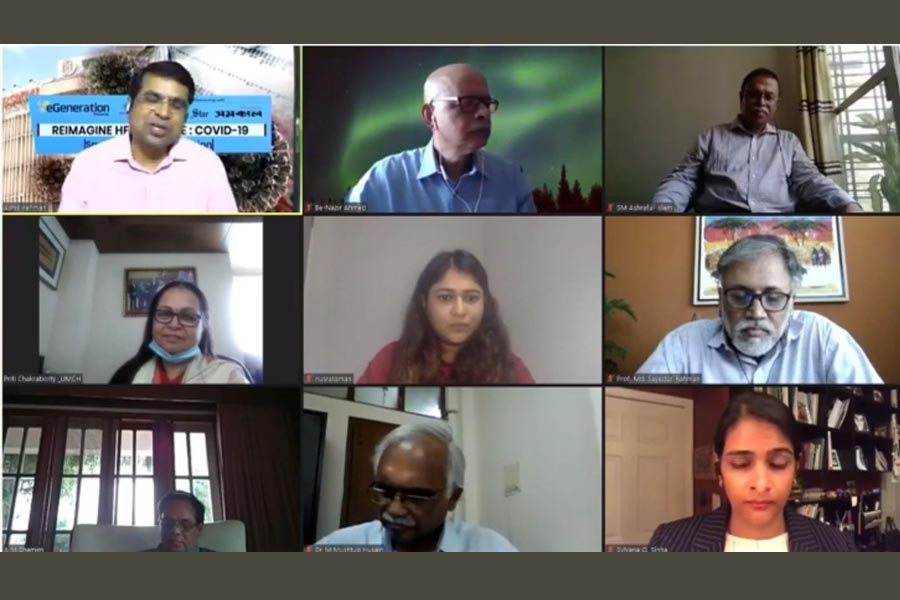To address how the healthcare sector in Bangladesh can thrive amid this global pandemic, eGeneration recently organised a webinar titled “Reimagine Healthcare: Save Lives with Innovation” powered by RTV and in partnership with two local dailies.
The webinar was joined by healthcare experts from the leading public and private hospitals.
Syed Ashik Rahman, CEO of RTV and the moderator of the webinar said, “In this reality, if the capabilities of information technology are utilized in the medical sector, it will be possible to provide the necessary medical services and advice to people across the country, greatly reducing the risk of possible infections, and saving the lives of a large number of people.”
Mr. S. M. Ashraful Islam, Executive Vice Chairman of eGeneration Group said, “We are facing an uphill task to provide healthcare services due to lack of medical professionals worldwide. Technology can bridge the gap between demand of medical services and our capacity to give the needed services. eGeneration has different digital services like telemedicine, ICU management system, Electronic Health Record (EMR), and Machine Integration that can improve the capacity, efficiency and productivity of the healthcare sector.”
Ms. Nusrat Feroz Aman, Director & Chief Patron, Ayat Skill Development Center said, “It will be unfair if we exclusively penalize Bangladesh for having a limited healthcare system as we can observe similar flaws in the healthcare system of several other countries across the globe. Moreover, our frontline workers are our heroes, thereby, protecting them is even more crucial. This can be achieved by utilizing technology to train, retrain, recertify our COVID-19 health workers.”
Ms. Priti Chakraborty, Chairman, Universal Medical College said, “We had introduced many hotline numbers through social media and newspaper to continue the treatment of a vast number of patients. Telemedicine is capable of being amongst the top services that will cater to patients effectively during this unprecedented time.”
Dr. Mohammad Mushtuq Husain, Consultant & Chief Advisor Institute of Epidemiology Disease Control and Research said, “It will be extremely beneficial if we can have the ability to immediately deliver test results to people through an automatic digital data entry platform. This will help COVID-19 patients to instantly isolate themselves and take the necessary precautions.”
Dr. A. M. Shamim, Managing Director, Labaid Group said, “With the implementation of Big data, Electronic Health Record (EHR), Telemedicine, we can reduce the rapid spread of the virus by 50%. If the healthcare sector starts working closely with the IT industry, the sufferings of the patient will reduce drastically. The pandemic has provided us with this incredible opportunity, and we should tap it.”
Ms. Sylvana Quader Sinha, Founder, Chairman & CEO, Praava Health said, “Telemedicine should be our first line of defense. This will discourage patients to access healthcare facilities physically. We are recommending consultation with doctors over the telephone or through video conferencing at the initial stage. Moreover, we are grateful that we have been able to shift most of our in-clinic appointments to telemedicine.”
Prof. Benazir Ahmed, Country Lead, ASCEND Bangladesh said, “Our first crucial step towards the prevention of COVID-19 is by wearing masks. It needs to become a necessary part of our face. Moving forward, the people in the lowest quintile will start to suffer a catastrophic health expenditure and we need to work towards lowering their burden. Furthermore, the situation emphasizes the use of technology to track COVID-19 patients to reduce the escalation of the virus and endorse paperless management of healthcare operations for a more efficient environment.”
Prof. Dr. Sayedur Rahman, Professor and Chairman, Department of Pharmacology, Bangabandhu Sheikh Mujib Medical University said, “The information regarding the availability of beds in a hospital should be merged into one platform and setup immediately to enable Bangladeshi residents to easily track which hospital they should visit for instantaneous assistance. This will prove to be a crucial support for both, hospitals and patients.”
-rmc///


